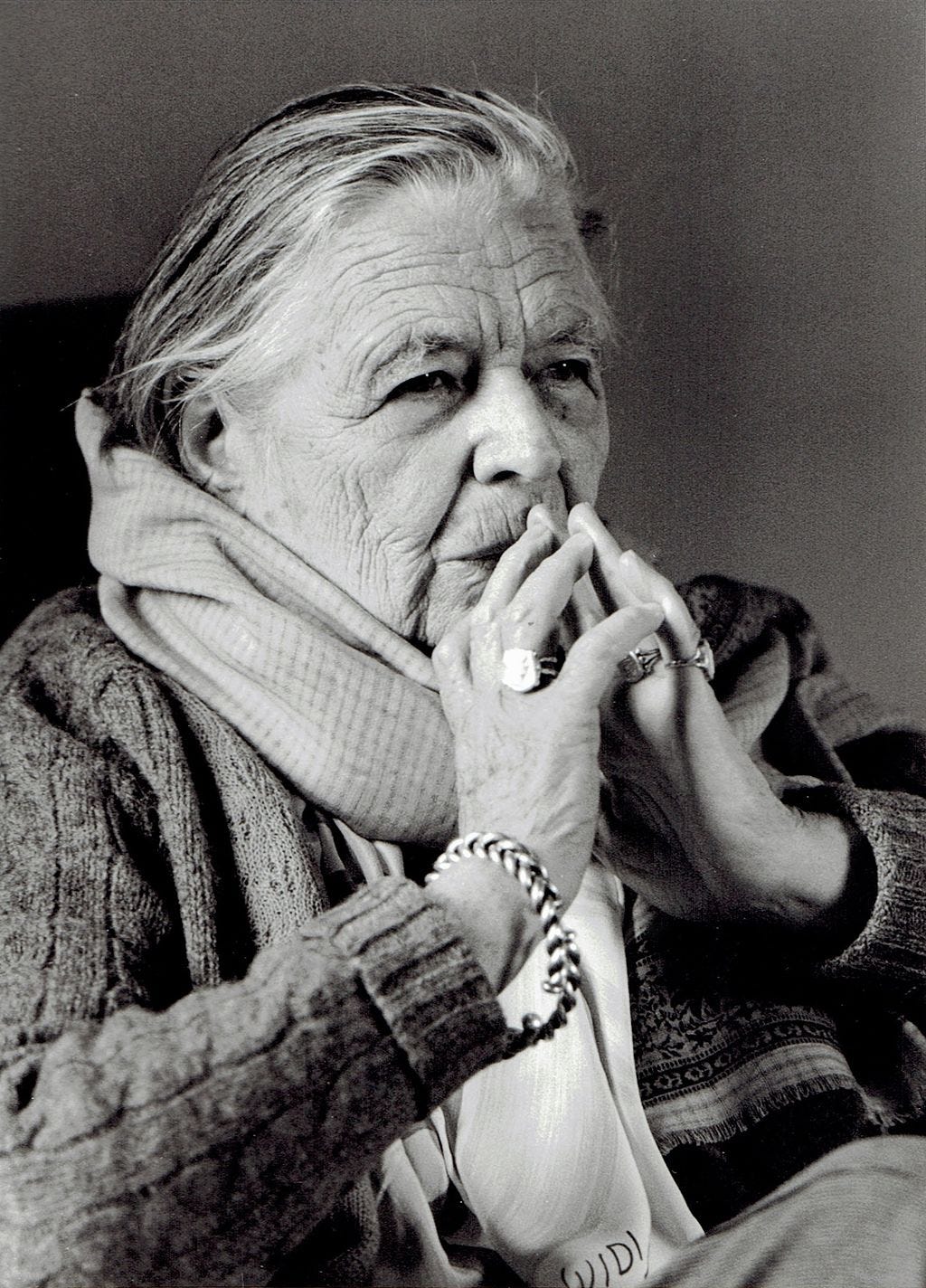Half History, Half Magic
Over twenty years, Marguerite Yourcenar became the vessel for a long-dead Emperor's spirit and channeled his wisdom and humanity.
Tens of thousands of pages of notes and rough drafts nearly all burned. The manuscript and the notes she wrote in her twenties—all gone. From the ashes,1 twenty years later,2 came the distilled essence of this process, the Memoirs Hadrian.3
“My dear Mark.”
The book reads like a personal letter from the dying ruler to his adoptive grandson, Marcus Aurelius, reflecting on his life with a mixture of pride, regret, and unflinching honesty.
Marguerite Yourcenar’s4 language is a beautiful and highly stylized French that feels like Latin; the cadences are those of Latin, and every word she uses is originally derived from Latin or Greek (hard to imitate in translation to a non-Romance language.)

She didn’t just write about the Emperor, she became him. Hadrian takes life from her work.
“Sheltering the flame of my lamp with my hand, I would lightly touch that breast of stone. Such encounters served to complicate memory’s task; I had to put aside like a curtain the pallor of the marble to go back, in so far as possible, from those motionless contours to the living form.. Again I would resume my round; the statue, once interrogated, would relapse into darkness; a few steps away my lamp would reveal another image; these great white figures differed little from ghosts. I reflected bitterly upon those magic passes whereby the Egyptian priests had drawn the soul of the dead youth into the wooden effigies… I had done like them; I had cast a spell over stones which, in their turn, had spellbound me.”
Yourcenar
Reminder: You can support my work and get extra insights—in-depth ideas, information, and interviews on the value of culture.
Become a supporter and access new series, topic break-downs in The Vault.
Where Yourcenar fades into the background, Hadrian begins to take shape.
The future Emperor described his origins in a sleepy Spanish town. His grandfather divined that he would one day be ruler of the world. Shortly thereafter he’d be the first of those closely connected to Hadrian to die, found dead on his farm and torn by birds of prey.
Distant uncle Trajan, the current emperor, eventually called Hadrian to serve as a military commander in Dacia. The relationship between the two men is strained, but Hadrian performs well and retains his position.
Trajan’s ambition, however, leads him to folly and he decides to invade the Parthian Empire. Isolated in Mesopotamia, Trajan’s health breaks down and eventually he dies, leaving Hadrian as his successor under suspicious circumstances.
With Trajan’s conquest of Mesopotamia just before his accession to the throne, the Empire had reached its peak. It was then clearly over-extended and threatened with collapse. Hadrian immediately withdrew from the newly won territories and made peace with his foreign enemies and purged a few rivals from within the Empire.
As Emperor he stopped the expansion of the empire and spent his time shoring up the relationship of Rome with the people of all the nations that composed the Roman Empire.
He wanted everyone to have skin in the game. “I was determined that even the most wretched, from the slaves who clean the city sewers to the famished barbarians who hover along the frontiers, should have an interest in seeing Rome endure.”
His difficult task was to stabilise the Empire to the extent possible and maintain the increasingly uneasy peace. He succeeded well enough that he created a level of peace and financial prosperity the empire had never previously encountered.
Time and the weight of it
There’s a Latin expression—Lacrimae Rerum,5 the tears of things—that conveys the importance of this work. There’s no translation or equivalent of this expression in America. America is the anti- this word.6
Nonetheless, it has to do with time and the weight of it—a meditation on finding a pile of pottery shards and deciding what to do with them. Its time may or may not come to young cultures, eventually.
The task at hand is simple—leave advice for an heir to the throne—yet it’s not easy—this is someone young, not even related. What should one tell that he should know? The best way then is to talk about what happened.
And thus Hadrian’s story begins:
“My dear Mark,
Today I went to see…”
Keep reading with a 7-day free trial
Subscribe to On Value in Culture to keep reading this post and get 7 days of free access to the full post archives.


